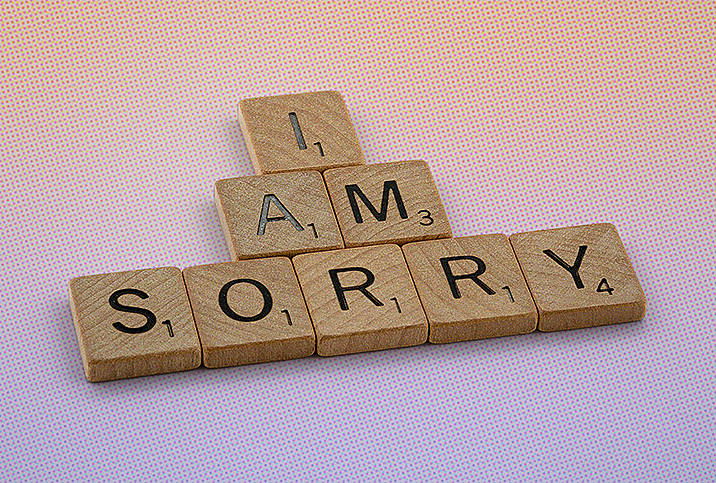Having a Healthy Marriage Means Saying 'I'm Sorry'

When two people live together for any length of time, there are bound to be disagreements—often about the most ridiculous things.
While these disagreements are usually forgotten, the more intense battles can often cause you to say hurtful things. Learning to say "I'm sorry" becomes essential to maintaining a healthy marriage that's free from resentment.
When to apologize
You can always try to justify your reasons for not apologizing, whether you feel your partner is being irrational, doesn't understand your perspective or is simply in a bad mood. But the truth is, people often avoid apologizing because they need to be right. It all comes down to ego, and when you do apologize, it's usually just to save face and it isn't a real apology.
Those insincere apologies can sound like "I'm sorry you're upset" or "I'm sorry you misunderstood me." Those are not really apologies at all; they're more like intentional digs at the shortcomings of your partner—and easily interpreted as such.
While any kind of apology can help you get past the initial issue, they rarely solve the problem in the long term. When you have an argument with your partner, it's important that you provide an honest apology because when you don't apologize, your partner may begin to harbor resentment.
This resentment can build over time and manifest itself in all kinds of ways: a poor sex life, lack of communication, confrontational attitudes and an overall lack of satisfaction, and that's just for starters.
The key to apologizing lies in understanding how you hurt your partner—only then can you offer a genuine apology that helps to heal your relationship.
Finally, there is no statute of limitations on giving an apology. If there is something you've never truly apologized for, it's not too late. Once you do apologize, though, give your partner time to process the apology and work through their emotions.
The benefits of an apology
You may be thinking, "Why should I apologize? My partner was just as nasty as I was. Where's my apology?"
The problem is that if you expect an apology in return, or you tell your partner that they are equally guilty, you'll completely shatter any repairs you've made with your own apology. Sometimes it's your turn to take it on the chin, sit on your hands and rely on your patience to get you through it.
While your partner may still feel hurt, a benefit of apologizing is that while they're processing the sincerity of your words, they will often offer an apology of their own, simply because they're beginning to evaluate the issue more clearly now that they're able to let go of the hurt they were feeling.
Another benefit of apologizing is it reveals your vulnerability and reaffirms your commitment to the relationship. By saying you're sorry, you're acknowledging you're human and that you make mistakes.
Many people avoid apologizing for anything because they believe it will be interpreted as a sign of weakness. But in reality, it takes strength to set your ego aside and admit that you've caused someone pain. When you apologize to your partner, you're really showing that your relationship is more important than being right, you're willing to work through the bad times, and you're willing to do whatever it takes to keep your relationship strong.
Moving forward after apologizing
Perhaps one of the biggest upsides of having an apology accepted is being able to move forward after conflict. Now that you have moved past the anger and reaffirmed your relationship, you can get back to the important part: spending time together and expanding your bond as a couple.
It's always important after a fight to do something together. Whether you decide to have a date night or do something nice for your partner, just remember that disagreements are a healthy part of any relationship as long as you make reconciliation a keystone of moving forward.
















